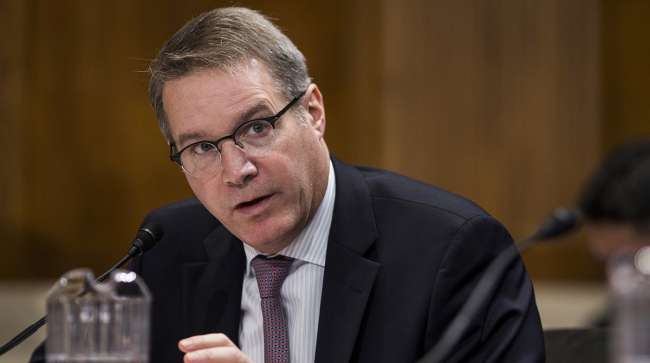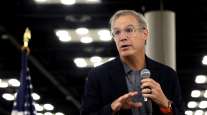Senior Reporter
ATA President Chris Spear Proposes Infrastructure Fund at Senate Transportation Hearing

WASHINGTON — The leader of American Trucking Associations asked Congress to consider establishing an infrastructure fund capable of generating about $340 billion over 10 years.
Through a 20 cents-per-gallon built-in fee on transportation fuels that would be collected at the terminal rack, the group’s Build America Fund proposal would significantly boost a shrinking federal transportation account, ATA President Chris Spear told the Senate Environment and Public Works Committee on Dec. 20.
The new fee would phase in over four years. Ultimately, the cost to the average driver would be slightly more than $100 annually, Spear said. Revenue generated by the fee would transfer to the Highway Trust Fund, an account managed by the U.S. Department of Transportation to help states pay for repairs and upgrades to surface transportation projects.
“The Highway Trust Fund is projected to run short of the revenue necessary to maintain current spending levels by 2021, creating a huge funding gap that could force states to cancel or delay critical projects." https://t.co/3PuIMtMTAs
— American Trucking (@TRUCKINGdotORG) December 20, 2017
“This proposal would stabilize the trust fund and resource project backlog,” Spear told the panel, noting that repairing and modernizing commercial highway corridors would help facilitate the movement of freight. According to the U.S. Department of Transportation, over the next 30 years about 65% more trucks will be on the roadways transporting freight.
Tolls along existing interstates and asset-recycling would be opposed by ATA, Spear said. Tolling would hinder safety by shifting a degree of traffic onto side streets, while transferring public assets to the private sector through asset-recycling in the case of highways has contributed to increases in toll rates, according to ATA’s assessment of recent research.
Along with the Build America Fund, transportation policymakers should produce a 10-year plan identifying viable and sustainable sources of funding for infrastructure projects, Spear said. The plan should be produced by a blue-ribbon commission tasked with exploring results from either completed or ongoing pilot programs. They would then recommend further research or the adoption of a sustainable funding approach.
“While ATA considers the [Build America Fund] the most immediate means for improving our nation’s roads and bridges, ATA also recognizes that due to improvements in fuel efficiency and the development of new technologies that avoid the need to purchase fossil fuel altogether, the fuel tax is likely to be a diminishing source of revenue for surface transportation improvements,” Spear said.
ATA President Chris Spear's Remarks to EPW Committee by Transport Topics on Scribd
Mark Policinski, chief executive of the Ohio-Kentucky-Indiana Regional Council of Governments, also called on senators to advance a sustainable funding account for infrastructure projects critical to freight movement.
"An investment program dedicated to multimodal freight infrastructure is necessary to ensure that public agencies can invest in their most critical goods movement needs, regardless of mode," Policinski said in prepared remarks. "Federal funding should incentivize and reward state and local investment, and leverage the widest array of public and private financing."
The trust fund’s authority expires in about three years. Revenue from the federal diesel tax of 24.4 cents per gallon and the 18.4 cents-per-gallon gas tax is projected to be insufficient to ensure its solvency. Federal fuel taxes were last raised in 1993.
Senators were noncommittal about the recommendations laid out at the hearing, although they acknowledged the Highway Trust Fund's funding woes.
“We have a unique opportunity ahead of us,” committee Chairman John Barrasso (R-Wyo.) said. “If we can pass major infrastructure legislation, we will grow our economy and help ensure the health and safety of every American.”
“We must work in a bipartisan fashion to really address these concerns and build consensus on a path forward for our economy,” added Sen. Tom Carper of Delaware, the committee’s ranking Democrat.
White House officials plan to introduce an infrastructure funding plan in January that would aim to provide agencies with $1 trillion over 10 years. Eighty percent of the funding would originate from the private sector, according to a blueprint the White House unveiled this year.




